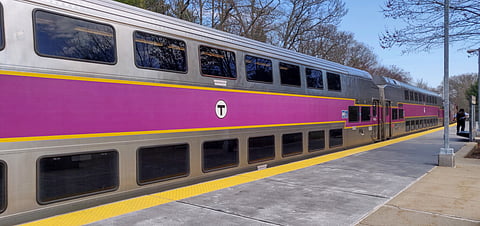Norwell Adopts MBTA Zoning Under Pressure, Considers Legal Action
After initially rejecting MBTA zoning requirements in May, Norwell residents reversed course at a recent Special Town Meeting, approving the controversial measure amid concerns about potential state penalties. Now town officials are considering joining a class action lawsuit against the Commonwealth over what Select Board Chair Jason Brown characterized as adoption "under duress."
"We had a gun put to our head and were told, 'adopt it or else,'" Brown said during the December 18 Select Board meeting, describing the pressure towns face to comply with the state's multi-family zoning requirements for MBTA adjacent communities.
The stakes for non-compliance were significant, according to town officials. The town faced potential cuts to Chapter 90 road funding, threats to other state grants, and possible impacts on school funding. Town Administrator Darlene Sullivan noted that communities that voted against the measure are already seeing consequences.
"I am hearing from another community that had voted no that there already is someone that is proposing to put multifamily in just in an area that was not part of the district," Sullivan reported, highlighting the risks of non-compliance. While that proposal was rejected, it illustrates the type of challenges non-compliant towns may face.
The pressure from state officials was immediate and intense. "The Attorney General has been watching every single town's vote like a hawk," Brown revealed, noting that communities that voted against the measure received non-compliance letters the same night as their votes.
Town officials emphasized that their support for the zoning change was strategic rather than enthusiastic. "We ended up adopting zoning to at least not suffer the financial consequences immediately, which all of us as taxpayers would've had to make up the slack almost immediately," Brown explained. The alternative would have been either increased taxes or service cuts to offset lost state funding.
The town is now exploring legal options. Brown announced plans to discuss joining one of the class action suits against the Commonwealth in January, with Town Council Bob Galvin expected to present the town's options. However, Brown stressed that this was exploratory: "It might not be in our strategic interest to join a class action suit, but I think it's at least worth having a conversation."
Select Board member Brian Greenberg, who presented the zoning article at the town meeting, has already indicated a willingness to revisit the decision if legal challenges elsewhere prove successful. Brown noted that Greenberg "would be the first one to bring forth an article to repeal the zoning" if the ongoing Milton case yields a favorable ruling.
The adopted zoning gives Norwell some control over where multi-family housing could be developed, which officials view as preferable to potential state intervention. Sullivan described the current zoning as "an insurance policy" that at least preserves town control over location. Without it, officials feared a state judge might override all local zoning restrictions.
The Attorney General's aggressive monitoring of town votes and swift action against non-compliant communities has created what officials describe as a coercive environment for local governance. Brown emphasized that while there are valid arguments both for and against multi-family housing in Norwell, the immediate threat of financial penalties effectively forced the town's hand.
As Norwell moves forward with the adopted zoning, town leaders are balancing compliance with exploring legal remedies. The January discussion about potential legal action will likely reveal whether Norwell joins other communities in challenging what local officials view as an overreach by state authorities.
The situation highlights growing tensions between state housing initiatives and local control, with communities like Norwell feeling pressured to adopt zoning changes regardless of local sentiment. As legal challenges proceed and more communities face similar decisions, Norwell's experience may prove instructive for other Massachusetts towns grappling with MBTA zoning requirements.

